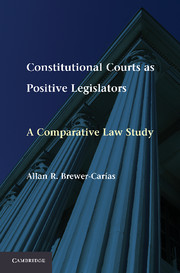Book contents
- Frontmatter
- Contents
- AUTHOR'S NOTE
- PART ONE CONSTITUTIONAL COURTS AS POSITIVE LEGISLATORS IN COMPARATIVE LAW
- CHAPTER 1 JUDICIAL REVIEW OF LEGISLATION AND THE LEGISLATOR
- CHAPTER 2 CONSTITUTIONAL COURTS' INTERFERENCE WITH THE CONSTITUENT POWER
- CHAPTER 3 CONSTITUTIONAL COURTS' INTERFERENCE WITH THE LEGISLATOR ON EXISTING LEGISLATION
- CHAPTER 4 CONSTITUTIONAL COURTS' INTERFERENCE WITH THE LEGISLATOR REGARDING LEGISLATIVE OMISSIONS
- CHAPTER 5 CONSTITUTIONAL COURTS AS LEGISLATORS ON MATTERS OF JUDICIAL REVIEW
- PART TWO NATIONAL REPORTS
- ARGENTINA
- AUSTRALIA
- AUSTRIA
- BELGIUM
- BRAZIL
- CANADA
- COLOMBIA
- COLOMBIA
- COSTA RICA
- CROATIA
- CZECH REPUBLIC
- FRANCE
- GERMANY
- BELGIUM, FRANCE, GERMANY
- GREECE
- HUNGARY
- INDIA
- ITALY
- MEXICO
- NETHERLANDS
- NORWAY
- POLAND
- PORTUGAL
- SERBIA
- SLOVAK REPUBLIC
- SWITZERLAND
- UNITED KINGDOM
- UNITED STATES OF AMERICA
- VENEZUELA
- PART THREE SYNTHESIS REPORT: CONSTITUTIONAL COURTS AS POSITIVE LEGISLATORS IN COMPARATIVE LAW
- APPENDIX
- INDEX
BRAZIL
Constitutional Courts as Negative Legislators: The Brazilian Case
Published online by Cambridge University Press: 04 August 2017
- Frontmatter
- Contents
- AUTHOR'S NOTE
- PART ONE CONSTITUTIONAL COURTS AS POSITIVE LEGISLATORS IN COMPARATIVE LAW
- CHAPTER 1 JUDICIAL REVIEW OF LEGISLATION AND THE LEGISLATOR
- CHAPTER 2 CONSTITUTIONAL COURTS' INTERFERENCE WITH THE CONSTITUENT POWER
- CHAPTER 3 CONSTITUTIONAL COURTS' INTERFERENCE WITH THE LEGISLATOR ON EXISTING LEGISLATION
- CHAPTER 4 CONSTITUTIONAL COURTS' INTERFERENCE WITH THE LEGISLATOR REGARDING LEGISLATIVE OMISSIONS
- CHAPTER 5 CONSTITUTIONAL COURTS AS LEGISLATORS ON MATTERS OF JUDICIAL REVIEW
- PART TWO NATIONAL REPORTS
- ARGENTINA
- AUSTRALIA
- AUSTRIA
- BELGIUM
- BRAZIL
- CANADA
- COLOMBIA
- COLOMBIA
- COSTA RICA
- CROATIA
- CZECH REPUBLIC
- FRANCE
- GERMANY
- BELGIUM, FRANCE, GERMANY
- GREECE
- HUNGARY
- INDIA
- ITALY
- MEXICO
- NETHERLANDS
- NORWAY
- POLAND
- PORTUGAL
- SERBIA
- SLOVAK REPUBLIC
- SWITZERLAND
- UNITED KINGDOM
- UNITED STATES OF AMERICA
- VENEZUELA
- PART THREE SYNTHESIS REPORT: CONSTITUTIONAL COURTS AS POSITIVE LEGISLATORS IN COMPARATIVE LAW
- APPENDIX
- INDEX
Summary
INTRODUCTORY CONSIDERATIONS
One of the main topics proposed for discussion at the eighteenth International Congress of the International Academy of Comparative Law was the legislative role of Constitutional Courts in contemporary democracies. The Brazilian state, like many of those from the Iberic and Latin American tradition, can be characterized as a mixed legal system that attempts to reconcile a model of diffused and incidenter tantum judicial review with a concentrated and abstract model in which the Constitutional Court pronounces abstract decisions in direct actions of unconstitutionality. These decisions have erga omnes and strictly binding effects.
Before the Constitution of 1988, the Brazilian system of judicial review could be classified as much more akin to the American tradition of judicial review than to the Austrian model developed by Hans Kelsen, which concentrates the jurisdiction on constitutional matters in a single Constitutional Court. Every judge was (and still is) competent to assess a violation of the Constitution by the ordinary laws. The declaration of unconstitutionality was merely a step for the judge to follow in the justification of his or her decision. Even though a dispute over the constitutionality of an Act could eventually reach the higher courts by means of an appeal, there was no warranty that this would ever happen.
Although there was an abstract action for assessing the constitutionality of statutes, the scope of this action was very strict and only the General- Attorney of the Republic (who was at the same time the Procurador [Prosecutor] of the Federal Government and the Chief of the Public Ministry) was empowered to bring it before the Supreme Court.
- Type
- Chapter
- Information
- Constitutional Courts as Positive LegislatorsA Comparative Law Study, pp. 283 - 314Publisher: Cambridge University PressPrint publication year: 2011
- 1
- Cited by

